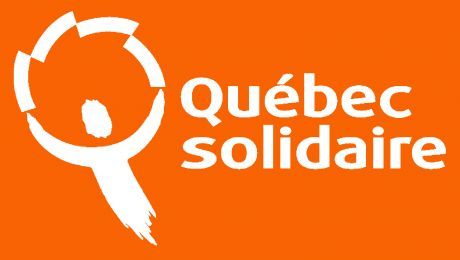News
You are here
QS convention says no to electoral pacts

May 23, 2013
Three great things happened at last month’s Québec solidaire (QS) congrès.
No to electoral pacts
First, the membership clearly laid to rest, once and for all (at least until after the next election), that they were not interested in forming any kind of electoral pacts with other political parties. This decision was based on a clear assessment of the current political landscape, where even the most progressive of the political parties on the Quebec scene apart from Québec solidaire have shown themselves to be bankrupt of any real ideas to support the needs of Quebeckers.
This includes Option nationale, with its veneer of social democratic ideas that led many to believe it was a natural partner for QS. Since the election, its focus on the national question in both an undemocratic way and in a way that excludes social questions has exposed it for what it is – a mere vehicle for its leader, Jean-Martin Aussant, to demonstrate his continued commitment to a neoliberal state.
Not even placing demanding conditions on such pacts was acceptable to delegates at the meeting. The idea that we could expose the hypocrisy of the PQ by requiring pacts to be founded on ideas like proportional representation and sound ecology, while abstractly interesting, was recognized as a failed approach from the last election and rejected by the majority as too electoralist and counterproductive, playing on the same field as the rest of the political parties. QS aims to do politics differently, and it can’t do so by always playing the same game.
Andrès Fontecilla elected
Second, Andrès Fontecilla was elected as extra-parliamentary co-spokesperson and party president. This role is the one until recently played by feminist and social justice activist Françoise David, who was elected to the National Assembly last fall. Since she is now in the National Assembly, she no longer plays the extra-parliamentary role that, for all intents and purposes, was created for her. After Khadir announced his intention to reduce his role as MNA by ceasing to play the parliamentary spokesperson role, that job fell to David. Thus, an election was called to find a new second spokesperson. Because QS adheres to gender parity, the new spokesperson had to be a man. So Fontecilla is seen as filling the very significant shoes left by Amir Khadir (when he wasn’t throwing them at pictures of George Bush).
Fontecilla was seen as a viable, but long shot, candidate by many, who expected the more polished and younger Alexandre Leduc to win. Both had successes in the last election, as candidates in their ridings. Leduc came in a fairly distant second behind the PQ in one of their stronghold ridings. Fontecilla came in a very close third behind the PQ’s second, in a three-way race with the Liberals.
Fontecilla, originally from Chile, has a long record of support for anti-poverty campaigns, acting as the coordinator of several community groups in Montreal. A member of Union des forces progressistes (UFP, QS’ predecessor) since its founding, he campaigned on the platform of strengthening the “party of the street” portion of QS dual nature, arguing that QS has largely been reactive to social movements rather than playing a role in actually building them. He is also identified with a view of the struggle Quebec independence that sees it as inseparable from fighting for a better society. Finally, his choice marks the second time QS has chosen a spokesperson born outside of Canada.
Ecosocialism
Third, the newly minted réseau écosocialiste had a presence that allowed for recruiting several new members, and for the group to raise its profile for the first time at a national meeting. Because it is new, and has decided not to form a formal collective inside the party, its efforts were limited. But despite this, members managed to positively affect the two most important discussions of the weekend: the debate on electoral pacts, and the concrete delivery of its major success at the last conseil national, which was to win a commitment to a political campaign to raise the profile of the party as a real alternative to the existing parties. The réseau has now developed materials to promote itself in an accessible way, and is working on building regional structures.
The new QS campaign is a synthesized and focussed version of QS’ major political commitment: Plan vert, a radical vision to transform Quebec’s economy and its social relations to realize fundamental changes to the benefit of the environment and the social good. The details of this campaign will emerge from a combination of building in the local associations and the regions to ensure relevance to local issues, and a national communication strategy.
Next steps
Aside from its immediate need to retain the more than 8000 new members it has acquired since last spring, prepare for the next election, and roll out its campaign, the next big challenge for QS will be to articulate the next section of its program, on women and the family. There will be many opportunities to discuss the importance of fighting oppression in all its forms in order to build the Quebec we need.
One debate that some may attempt to renew is that around the wearing of religious symbols, but given the lack of welcome for that discussion to be re-opened at the conseil national in December, those seeking to reopen the discussion will have little luck. The left can be expected to do all it can to prevent the debate from being re-opened.
If you like this article, register now for Marxism 2013: Revolution In Our Time, a weekend-long conference of ideas to change the world. Sessions include "Women, resistance and revolution", "Quebec, First Nations and Canadian imperialism" and "From Orange Wave to Third Way? The NDP under Mulcair."
Section:










